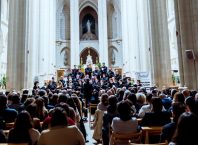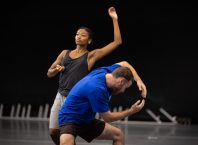
The Israeli Opera will open its 40th season with a thrilling production of Henry Purcell’s Dido and Aeneas, directed by Stefano Poda, and conducted by Gerd Amelung. The libretto by Nahum Tate features magical elements, a tragic love story, and the story of a powerful woman, Dido, Queen of Carthage. The opera will be performed from November 16 – 28, 2025.
Poda is renowned for the all-encompassing vision he brings to the operas he directs, in which the spectacular visual elements, dramaturgy, and music all merge to create a unique experience. In the operas he directs, Poda designs set, costumes, lighting design and movement. His previous productions performed at the Israeli Opera are indelibly etched on the memory of everyone fortunate enough to see them – Antonin Dvořák’s Rusalka in 2024, Jacques Offenbach’s Les Contes d’Hoffmann in 2022, and Charles Gounod’s Faust in 2017.
As the Israeli Opera opens its 40th season it is a time to reflect on the past, and appreciate all that has come to pass over the past four decades. Dido and Aeneas was the first opera ever to be performed at the Israeli Opera in 1985, directed by Hanan Snir. One of the most impressive accomplishments of the Israeli Opera, in addition to its many international collaborations, is the Meitar Opera Studio which has nurtured a new generation of Israeli Opera singers. Its graduates have made their mark and won the hearts of audiences in leading roles on the Israeli Opera stage as well as international productions. Dido and Aeneas will feature a superstar lineup of Israeli soloists: Anat Czarny and Tamara Navoth alternating as Dido; Oded Reich and Noam Heinz alternating as Aeneas; Daniela Skorka and Tal Ganor alternating as Belinda; Shay Bloch and Rona Shrira alternating as the Sorceress.
Yet another enticing feature of this production will be its accompaniment by the Barrocada – Israeli Baroque Collective. Founded in 2007 by a group of passionate, talented enthusiasts, they bring the era to life playing period instruments. The ensemble’s string instruments were built by its music director Amit Tiefenbrunn, and the bows by lute player Eitan Hoffer. Barrocada has participated in Baroque-era operas at the Israeli Opera since 2019.
The opera will be conducted by Gerd Amelung, a conductor with rich experience in Baroque music. Amelung was gracious to step in on short notice to replace Maestro Jean-Christophe Spinosi who unfortunately had to cancel due to health reasons.
The libretto of Dido and Aeneas by Nahum Tate (1652 – 1715) was adapted from his play Brutus of Alba, or The Enchanted Lovers. Based on Book IV of The Aeneid by Virgil, there is a significant difference in the catalyst for events. Dido, founder and Queen of Carthage, falls deeply in love with the Trojan hero Aeneas. At first resistant and sorrowful, because she fears this love will weaken her as a ruler, she accepts his proposal of marriage. According to Virgil, the gods have commanded Aeneus to travel to Rome where he shall found a new Troy. However, in Tate’s version, a sorceress wishes to destroy Dido, and makes Aeneas believe that the gods are commanding him. Dido is angry at Aeneas’s abandonment. He relents and tells her that he shall stay, but hurt that he would even consider leaving her, she tells him to go, and dies of a broken heart.
Composer Henry Purcell (1659 – 1695) is best known for composing over 100 songs; Dido and Aeneas; and music to a version of Shakespeare’s A Midsummer Night’s Dream called The Fairy Queen. His musical training began as a child, as a chorister at The Chapel Royal. As he advanced, in 1677 he was appointed the composer for Charles II string orchestra, and in 1679 was appointed organist of Westminster Abbey, and in 1682 became one of three organists of the Chapel Royal. He held all three positions through the reigns of three monarchs: James II, William III, and Mary. It is not known precisely when, or for which monarch, he composed Dido and Aeneas. Parts of the score were lost during the long interval, almost 200 years, in which the opera was not performed. Productions of the opera have selected different approaches to the missing parts, the Israeli Opera has chosen to add a dance interlude, with music composed by Purcell, and Poda has created for this production choreography for 16 dancers.
Performances will take place at the Israeli Opera from November 16 – 28, 2025. Additional information and tickets are available on the Israeli Opera website.





